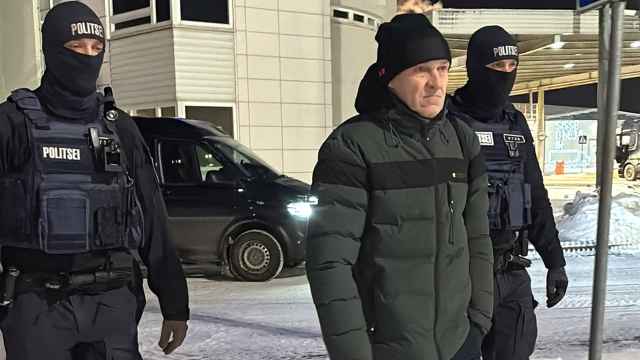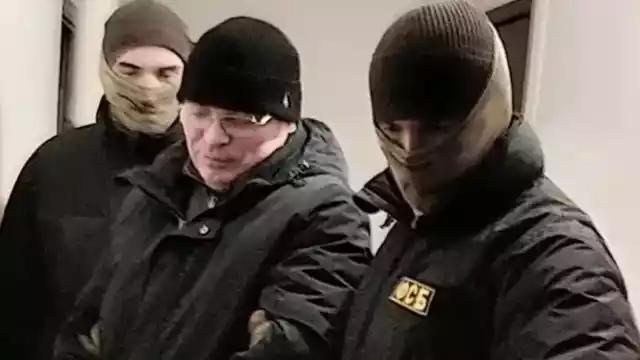Vladimir Antonov, whose grandfather worked on the Soviet atomic bomb, opted for a career in banking when he arrived in Moscow in the early 1990s.
Almost two decades later, fallout from that choice is being played out across Europe as authorities try to trace the whereabouts of more than $1.6 billion missing from banks owned by the 36-year-old Russian in Lithuania and Latvia.
Antonov, whose network of companies also included English football club Portsmouth, a Dutch sports car maker that went on to buy Saab Automobile, and banks in Panama and Ukraine, is scheduled to appear at court Friday in London. He was arrested on Nov. 24 in Britain with a business partner, Raimondas Baranauskas, at the request of Lithuanian prosecutors wanting to charge them with fraud and embezzlement. They both deny any wrongdoing.
Antonov grew up in the former Soviet state of Tajikistan, the grandson of Yury Antonov, one of the founders of the Soviet atomic program. He is a car enthusiast who was blocked by the European Investment Bank from investing in Saab as long as the Swedish car company owed the bank money. He previously was stopped in December 2009 from being involved in the purchase of Saab from U.S. carmaker General Motors.
Snoras was barred from opening in Britain by the Financial Services Authority, alleging that the bank wouldn't deal with the regulator in an "open and cooperative way," the FSA said in a statement on March 3, 2009.
Snoras, which was majority-owned by Antonov, was seized by the government in Vilnius on Nov. 16 on concern that it was performing illegal operations. The Baltic nation's central bank said regulators are now looking for 3.4 billion litai ($1.3 billion) that is unaccounted for.
Antonov and Baranauskas called it a "state-sanctioned raid" on the bank and vowed to protect their business from the "forced nationalization," they said in a statement e-mailed on Nov. 21 through their spokeswoman, Natalja Olesik.
In Latvia, the banking regulator halted operations of Latvijas Krajbanka, a unit of Snoras, on Nov. 21 because of missing funds. About 167 million lati ($311 million) needs to be recovered, Janis Brazovskis, deputy head of the regulator, told national television on Dec. 11.
Lithuanian Prime Minister Andrius Kubilius said on Nov. 25, the day Antonov and Baranauskas first appeared in court in London, that Snoras was "an institution of possibly criminal financial machinations."
Should he be extradited to face the charges in Lithuania, he faces up to 10 years in prison if found guilty, according to prosecutors in Vilnius.
Antonov was released on bail by a British judge. He "strenuously denies dishonesty in any of his dealings," Rachel Scott, one of his lawyers, told the court.
Prosecutors in Vilnius seized personal assets valued at 300 million litai from former Snoras shareholders, Ruta Dirsiene, spokeswoman for the Lithuanian Prosecutor General's office, said Dec. 6.
Latvian police spokeswoman Sintija Virse confirmed on Dec. 12 that officers had seized 14 cars and one house registered to Antonov in Jurmala, a wealthy town about 20 kilometers from Riga.
Antonov's company, Convers Group Management, originated in 1999 when, aged 24, he bought a stake in a Russian bank for $200,000, according to a report by research consultancy Kroll dated Dec. 16, 2009, and made public by the Swedish debt office a year later.
The report was commissioned after Antonov tried to secure Saab and found no evidence of illegalities.
Antonov's Moscow-based Konversbank bought Bankas Snoras in March 2003, saying the Lithuanian bank was a vehicle to enter European Union markets. He built it into Lithuania's third-largest bank by deposits.
Antonov's Convers Group, the company he chairs along with his father, Alexander Antonov, included Bankas Snoras, Krajbanka, Conversbank in Ukraine and Banco Trasatlantico in Panama.
Vladimir Antonov signed an agreement on Nov. 19 to sell his 85.16 percent stake in Banco Trasatlantico to the bank's minority shareholders, all Panamanian, banking regulator Superintendencia de Bancos de Panama said Dec. 6. The contract is currently under review by the regulator, it said. He also sold his Kiev-based Conversbank to a group of investors on Nov. 22, the bank said on its web site.
According to the British registry on Dec. 9, he resigned as a director of Portsmouth football club on Nov. 29.
Alexander Antonov worked in uranium enrichment plants owned by the Soviet government until 1993, when he moved his family to Moscow to join Vladimir, the Kroll report said. He was shot and wounded in Moscow in March 2009, the Russian Prosecutor General's Office said on its web site. Antonov and his bodyguard were hit by automatic-weapon fire as they walked to Antonov's car, the Kommersant newspaper reported on March 12, 2009.
Vladimir Antonov told Kroll the assassination attempt was linked to a conflict in Russia over the assets of his holding company. Both men then chose Britain as their domicile, Kroll said.
Antonov junior told the Lithuanian daily Respublika in an interview published on Nov. 25 that he feared for his life. "I understand that extradition is inevitable," he said. "I can say it openly: I am scared that I may get killed."
A Message from The Moscow Times:
Dear readers,
We are facing unprecedented challenges. Russia's Prosecutor General's Office has designated The Moscow Times as an "undesirable" organization, criminalizing our work and putting our staff at risk of prosecution. This follows our earlier unjust labeling as a "foreign agent."
These actions are direct attempts to silence independent journalism in Russia. The authorities claim our work "discredits the decisions of the Russian leadership." We see things differently: we strive to provide accurate, unbiased reporting on Russia.
We, the journalists of The Moscow Times, refuse to be silenced. But to continue our work, we need your help.
Your support, no matter how small, makes a world of difference. If you can, please support us monthly starting from just $2. It's quick to set up, and every contribution makes a significant impact.
By supporting The Moscow Times, you're defending open, independent journalism in the face of repression. Thank you for standing with us.
Remind me later.





